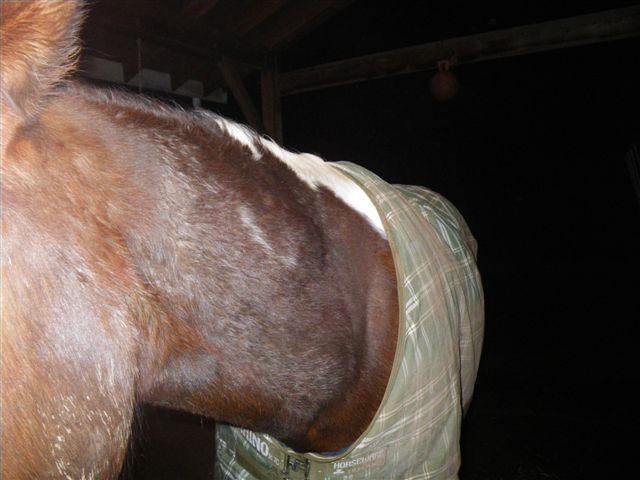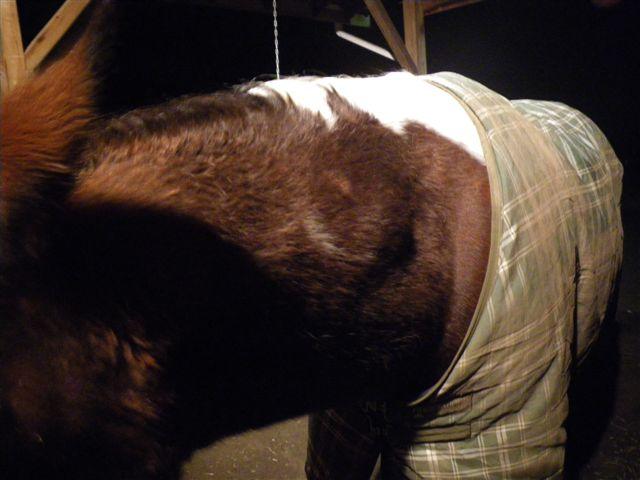| Home Medical Index | First Posted: July 6, 2007 Jan 21, 2020 | |
West Nile Virus "West Nile Virus is a mosquito-borne zoonotic (affecting humans and specific animal species) arbovirus belonging to the genus Flavivirus in the family Flaviviridae. It is commonly found in temperate and tropical regions of the world. Horses are highly susceptible to the virus, which causes the neurologic disease West Nile encephalitis.
AAEP Core Vaccines: Eastern/Western equine encephalitis, Rabies, Tetanus, and West Nile virus. ..." West Nile Virus in US Horses Note: One of my horses had very bad reactions to Ft. Dodge vaccines. He reacted badly to the West Nile Virus injection and to the Rhino Flu injection. If you have this problem two other manufacturers were given to me. Many vets will not order single dose shots because they get orders of 10 shots at a cheaper rate. They may also feel more comfortable with a vaccine that they are use to using. Whatever the reason, you may find yourself having to address this problem on your own. Suggestions: You can, however, order your own injections from Valley Vet Supply    I took the above pictures of A Patchy after his injection with Rhino Flu vaccine made by Fort Dodge. He had been premedicated with bute, as stated above. A Patchy had the same type of reaction, but more severe, the next time he was inoculated with a Ft. Dodge West Nile Virus vaccine. I no longer give him any Ft. Dodge injections. He seems to be sensitive to whatever adjuvants Ft. Dodge uses. (Adjuvants are pharmacological or immunological agents that modify the effect of other agents {e.g., drugs, vaccines} while having few if any direct effects). Different West Nile Virus Genetic Lineage Evolving? Referenced from Ohio State University
Updated Information
"West Nile-Innovator DNA, a vaccine for horses to aid in the prevention of viremia caused by the potentially deadly West Nile virus, was launched by Fort Dodge Animal Health, a division of Wyeth, Dec. 4. Developed in collaboration with the U.S. Centers for Disease Control and Prevention (CDC), this represents a tremendous milestone in DNA science and vaccine technology, as it is the first DNA vaccine of its kind ever registered and the first DNA vaccine fully licensed by the USDA. 'Fort Dodge, which has a long-standing commitment to innovative research and product development, recognized the significant value of DNA in the prevention of infectious diseases in animal populations, as well as humans, and worked with the CDC to develop this product," said Steve Chu, DVM, PhD, executive vice president of Animal Health Research and Development, Fort Dodge Animal Health. "During this process, Fort Dodge made some groundbreaking discoveries that improved the preparation and formulation of the vaccine, enabling the successful development, testing and registration of the first product of its kind.'" West Nile Virus DNA Vaccine for Horses Introduced Recent epidemiological data suggests that vaccinated horses are three to 16 times less likely to die from West Nile Virus infections than are non-vaccinated horses. Few adverse reactions have been reported from the vaccine. West Nile Virus vaccine requires annual boosters. It is recommended that horses receive their boosters in May, to coincide with the onset of mosquito season. If horses have not previously been vaccinated, a two-dose schedule is recommended. Different vaccine products will vary slightly in the interval between vaccinations, so label directions should be closely followed. Foals experiencing their first mosquito season in South Dakota should get a series of two or three vaccine doses, generally beginning when they are three to four months of age. Epidemiological data suggests that vaccinated horses are three to 16 times less likely to die from West Nile Virus infections than are non-vaccinated horses. Few adverse reactions have been reported from the vaccine. West Nile Virus vaccine requires annual boosters. It is recommended that horses receive their boosters in May, to coincide with the onset of mosquito season. West Nile Virus (WNV) is a viral disease that can cause encephalitis or meningitis. (Infection of the brain or spinal cord or their protective coverings) It originated in Africa, and spread to Asia, and Southern Europe. WNV is now in the United States. How Does A Horse Contract West Nile Virus?
Horses become infected with WNV after being bitten by an infected mosquito. There is no evidence that horses can transmit WNV to other horses, birds, or people. Some symptoms of West Nile Virus include neurological symptoms: paralysis in the hind limbs, weakness in the hind limbs, and ataxia (incoordination). There may also be loss of appetite, lethargy, fever, twitching in the muzzle, vision loss, convulsions, difficulty swallowing, circling, wandering, and extreme excitability. Sometimes horses go into a coma. Other diseases also cause symptoms as described above including rabies, botulism, EPM, and other mosquito borne viral encephalitic diseases in horses. Contact your vet. There is no treatment for WNV.
Prevention
Currently, there are four vaccines available against West Nile Virus. It is imperative that horses are vaccinated according to the label on the vaccine. At least one yearly booster is recommended after the initial series. Horses that are stressed, such as show and race horses, should have two boosters annually, in April and late July. Horses vaccinated against Eastern, Western, and Venezuelan equine encephalitis are not protected against West Nile Virus.
Protect Your Horse From Mosquitos
Mosquito Reduction
You can reduce the number of mosquitoes around your home and neighborhood by reducing the amount of standing water available for mosquito breeding. Here are some simple steps you can take.
No. There is no documented evidence that West Nile Virus is transmitted from horse-to-horse. However, if at all possible, horses with suspected West Nile Virus should be isolated from mosquitoes and tested for the virus. Symptoms
Clinical signs for WNV include flulike signs, anorexic, depressed; skin and muscle twitching, mental changes, daydreaming, drowsiness, walking forward, often without control, and "spinal" signs, including asymmetrical weakness, and symmetrical ataxia (incoordination on one or both sides, respectively). Equine mortality rate can be as high as 30-40%. Incubation Period
The incubation period for a West Nile Virus infection is usually five to 15 days. Newest Research Results Coat Color and West Nile Virus
The newest research from Western College of Veterinary Medicine in Saskatchewan, Canada has found that it appears that light colored horses diagnosed with WNV may have a higher mortality rate than darker colored horses. Horses were divided into three groups:
Here are the results of the study: There were a total of 124 horses in the study group diagnosed with WNV.
How the immune system responds may have something to do with a genetic factor and coat color. For More Information: West Nile Virus/theHorseWest Nile Virus (Excellent) |